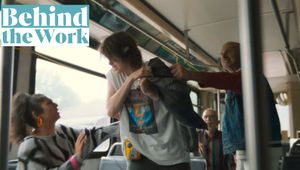
Talent in 2023: Crunchy Contradictions

At this week’s LEAD conference in London, the Advertising Association revealed that talent is at the heart of their three year strategy. With pay in the UK, at least, shrinking and a battle to attract the right skills and improve the diversity of the industry, talent is a major issue for brands, agencies and production companies alike.
That ‘talent crunch’ appears to still be a massive headache… but with 2023’s choppy economic waters ahead, employers now have to figure out how to win the talent war while also fending off pressures for more efficiencies. With these seemingly opposing forces swirling, it’s tricky to get a handle of what all this really means for talent. For example, on freelancers, will it see agencies cut permanent staff and opt for freelancers in order to improve their flexibility in tough times… or might agencies be looking to cut expensive freelance budgets and make better use of talent across geographies? And on diversity, equity and inclusion, how can agencies protect marginalised or underrepresented groups from bearing the brunt of the storms?
LBB’s Laura Swinton caught up with experts in the field of talent to find out more.
Maria O’Keeffe, Global Chief People Officer, Ogilvy
Events of the last few years have caused seismic shifts in how we work and subsequently the talent landscape. The proverbial war for talent continues and is evolving. We view these changes as opportunities to continuously evolve our talent mindset and approach. At Ogilvy, we rely on our borderless creativity to create impactful work for clients. The same applies to our approach to talent. If you are someone we deem a valuable member and culture-add to our team, conventional restrictions need not stand in the way.
Agencies will need to ensure that employment practices evolve to provide more variety, flexibility, and career ownership to attract and retain talent. The trick will be balancing flexibility with some fundamental truths of a creative industry. Creativity thrives in in-person settings. Careers flourish through human interaction. As an industry built on relationships, nothing can truly replace in-person engagement.
We will need to continuously listen, experiment, and adapt. There will be some who won't want to be on that journey; some may outright reject the idea of a required hybrid schedule and opt for an arrangement that is fully within their control. Ultimately, it will be a balancing act we need to get comfortable with.
Benjamin Major, Talent Discovery and Diversity Director, Media.Monks
Going into 2023, I predict that the freelance market will grow as agencies reduce their permanent headcount to cope with reducing costs. Clients will put more project based work out rather than larger retainers and so agencies will then move to take on more freelancers as they pitch and take on more project based work.
Diversity suffers in freelance. The freelance market isn't as diverse as the permanent market, with lots of nuanced reasons for this like maternity, socio-economic factors and seniority, for example. Self-employment accounts for 32% of Creative Industry employment in the UK compared with 16% for the economy more broadly at the moment [source]. The economic downturn also affects diversity in our permanent market. During the pinch agencies often tighten budgets around internships and junior level hiring. Internships seem an additional cost and agencies continue to struggle to make juniors billable.
The talent crunch doesn’t just start when young people take their first steps on the workfloor, it’s an issue at an educational level. The government continues to devalue the arts in education. Creative subjects in secondary schools have been in sharp decline since 2006 and the ‘lower-earning’ arts degrees are devalued. Recently launching the idea of additional maths tutoring for two years has, understandably, incensed the creative industry.
All of this contributes negatively to our talent crises in the creative industry. The creative industry has to step up and take control to safeguard its future. This means that we need to invest in long term programmes, rather than individual and small scale ‘performative’ programs, as they have little effect in their isolation. Rather than setting up your own programme, consider partnering with some of the great organisations out there that are actively - and successfully - working to improve diversity, such as Brixton Finishing School.
Toni Handler, Chief People Officer, dentsu Americas
It’s undeniable that there has been a ‘talent crunch’ that has been exacerbated by the covid pandemic and now an uncertain economy. Despite this, we at dentsu remain cautiously optimistic about the economic outlook and landscape for talent in 2023.
As a client-centric business, we hire according to our client needs and their business objectives. Our data shows that despite inflationary times, 77% of CMOs are feeling optimistic about the economic outlook. Further, CMOs are prioritising investment and optimization strategies to drive new and incremental growth. This signals a strong demand for talent, particularly in the areas of CX, creative, data, etc., and especially talent that has both hard and soft skills.
As we see the market shift from candidate-driven to employer-driven, we believe employee engagement alone is no longer enough. The employers who will succeed are those who operate as though there is power on both sides.
To attract and retain the best talent, it is critical that employers succinctly articulate and advertise their distinct EVPS and, most importantly, deliver on those promises. It is increasingly necessary to invest in talent through learning and development programs, enhanced benefits and rewards, focused on diversity, equity and inclusion, and opportunities to be a force for good.
Candidate’s priorities have changed, and candidates are more vocal about what they expect from their employee experience. Hybrid working options that allow for flexibility and autonomy will continue to be popular, and employees are willing to leave agencies that don’t provide this. At dentsu, our Future of Work strategy promotes flexible and purposeful work to support a thriving agile workforce.
Early career talent expects more from agencies in terms of purposeful, meaningful work that aligns with their personal values, as well as professional development, career mobility, and pay transparency. Employers should experiment to meet these priorities while balancing productivity, wellness, employee engagement, and tight budgets.
Gretchen Huestis, Group Director, Brand-led Change, Siegel+Gale
Will the talent landscape feel different in 2023? The short answer is yes and no. ‘The great resignation’ and associated drastic climb in those voluntarily leaving their jobs can in part be attributed to the thawing of pandemic “stay where you are” career decision-making. But it is also likely due to talent reevaluating their priorities and employment expectations – particularly concerning empowerment, flexibility, DEIB, and purposeful work. I expect these elevated standards to remain in place – especially for those in the highest demand (top performers and those possessing highly sought-after skills). As such, when recessionary pressures hit, agencies need to avoid the reflex response of cutting costs in areas core to delivering on this “new world of work.” Now is the time to invest in your leaders, elevating their skills in areas like empathy, listening, flexibility, and remote management. It’s also a good time to level up your remote working and digital technologies. To balance spending in these areas, we will see much more ‘quiet hiring’ - when organisations acquire new skills without hiring new full-time employees. This includes hiring for contractor positions but also moving current talent into new roles. This last point, when done right, represents a win-win opportunity that speaks to the new world of work while also facing economic pressures head-on. Organisations that will thrive will be transparent about their shifting talent needs and provide clarity on the growth opportunities for team members. Setting up programs that allow employees to voluntarily step forward to take on new skills or expanded responsibilities (with associated support) keeps talent costs in check while putting agency back in team members’ hands – a move that will make them feel valued and engaged.
David Austick, Head of Talent Acquisition in EMEA, dentsu Creative
We will continue to see some of the post pandemic effects on talent continue into 2023 but not to the same extent. We’ve experienced 2 year’s worth of suppressed talent movement in a condensed timeframe when things started getting back to normal, although we still see challenges in attracting talent across certain specialisms such as experience design and tech. Some of this can be attributed to the drain of talent moving client side lured by inflated salaries and hyper growth, however we are seeing this start to equalise with companies like Facebook, Amazon, Twitter and Salesforce all announcing substantial layoffs into 2023 due to the economic outlook.
History tells us that with any economic uncertainty there is often a drive for efficiencies, ensuring agencies are financially robust, reducing the reliance on freelancers or expensive consultancy fees.
On the one hand agencies might look to reduce overheads and freelance spend, on the other use freelance talent to respond to short term client demand rather than add long term permanent headcount.
Post covid there has been a paradigm shift attitudes towards work, it made people reframe their relationship with work and wider lifestyles entirely. We have been overdue a radical rethink of the structure of work for some time, but it was accelerated exponentially by covid and has led many to question the purpose of their work and the value it adds for clients and wider society.
We are focussed on building a team at Dentsu Creative that represents the world we live in so it makes us to work harder on our DE&I, early careers and social mobility initiatives to attract the next generation of diverse creative talent and make sure we create an environment where new and existing talent can thrive and feel rewarded and supported especially in difficult times.
Our recognition by Mind’s Workplace Wellbeing Index award reflects dentsu’s dedication to providing a caring and inclusive hybrid working environment that provides the flexibility for our teams to manage their work, life and personal responsibilities in a way that works best for them.
Louis Venezia, CCO/CEO, Pilot Content
Balancing the spend on staff and freelance is always mission critical to our bottom line. Doing so in the wake of the pandemic’s “talent crunch” and our industry’s (entertainment marketing) contractions and consolidations is an even bigger challenge. We think 2023 is going to be a reset for the entertainment industry. The talent pool will be changing, too. Our goal in 2023 is to strengthen ties with existing talent relationships – tried and true freelancers we’ve worked with for years – while looking for new talent available in the market due to layoffs. There are top notch freelancers as well as former staffers who are going freelance – all part of 2023’s new talent pool. Many will become staff at agencies augmenting smaller teams – perhaps even ours. But many will try freelance for the first time and some will consider opening their own shops creating LLCs or S-Corps and like the creator economy, growing the entrepreneur pool.
The thing I think has changed indefinitely, and for the greater good in 2023 and beyond, is the need for agencies to look after their talent before a crisis hits. The wellbeing of your freelancers and employees extends beyond a timecard. Are you building systems and workflows within your agency that give your talent confidence and stability while remaining attuned to client demands? Though the economy continues to signal tough times ahead, talent – in good times and bad – has always delivered best when expectations are a two-way street.















